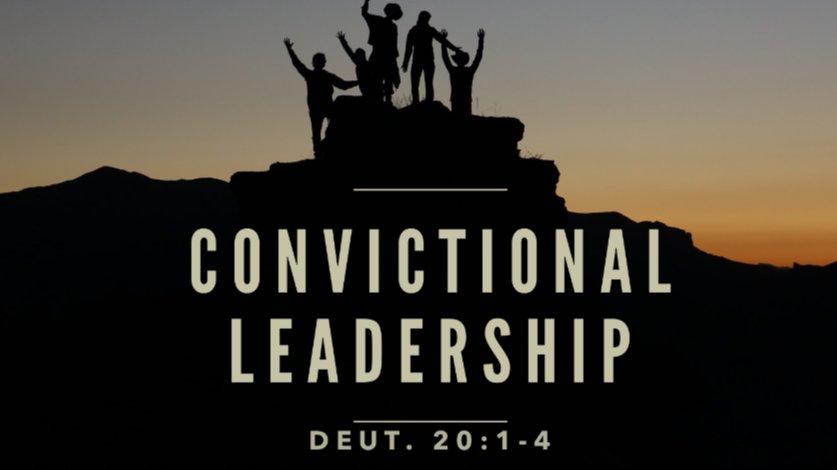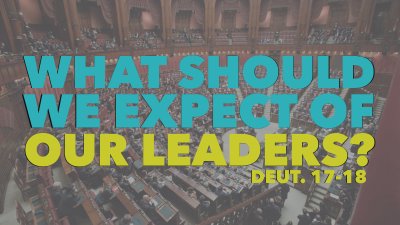Convictional Leadership
Among the greatest challenges of our day is the lack of leaders who possess the courage to stand for their convictions. This is becoming especially obvious among believers today. There is a cost to pay for anyone who possesses convictions that are not in line with the power brokers today. The tendency for most people is to go with the flow or keep your head down and hope to fly under the radar.
The leadership crisis is actually two-fold. There is a need for courageous and effective leaders and there is also a need for leaders with Biblically informed convictions. “If our leaders are not passionately driven by the right beliefs, we are headed for disaster. At the same time, if believers cannot lead, we are headed nowhere” (Mohler, The Convictional Leader, 20). How can we raise up, encourage, and equip convictional leaders in our families, church, and community?
The promise and marketing of technology are "constantly telling the masses that the future will be better because the conditions of life are going to be softened” (Weaver, Ideas Have Consequences,108). Richard Weaver says this has resulted in a softening of concepts of heroism, hard work, and perseverance. Those who are driven by conviction and purpose are not concerned with the easiest and most comfortable path. “Since he who longs to achieve does not ask whether the seat is soft or the weather at a pleasant temperature, it is obvious that hardness is a condition of heroism. Exertion, self-denial, endurance, these make the hero, but to the spoiled child, they can note the evil of nature in the malice of man”(Weaver, 109).
“Without work do, especially without work that is related to our dearest aims, the mental sinews atrophy, as do the physical. There is evidence that the masses, spoiled by like conditions, encourage similar flabbiness and in crisis will prove unable to think straight enough to save themselves”(Weaver,116).
In Deuteronomy 25:1-4, Moses is preparing a nation of former slaves and current nomads for war and conquest. He tells them, “let not your heart faint. Do not fear or panic…” How can we be, and equip, leaders with the courage of their convictions for the battles that lie ahead?

Convictional Leadership
Deuteronomy 25:1-4
April 11, 2021 • Pastor David Anglin
Why is God Jealous?
January 30, 2022 • Luke Anglin • Deuteronomy 4:23–24
Why did God send Babylon to destroy Jerusalem and take the Jewish people into captivity? Is God bitter and jealous or loving and kind? The celebrity Oprah Winfrey claims that the teaching of God as a jealous God is what made her leave Christianity. Once, she recounted the time she heard her pastor in a sermon declare that God is jealous. She says about that moment, “[...] something about that moment didn’t–didn’t feel right in my spirit, because I believed that God is love [...].” All throughout the Bible, there are commands to love God and to worship Him. A major example of this is Deuteronomy 6:5: “You shall love the Lord your God with all your heart and with all your soul and with all your strength.” Additionally, the Bible has many commands to not worship other false gods or idols; for example, we are told in Exodus 20:3, “You shall have no other gods before Me.” But if we really stop to think about these commands, it can often be somewhat bothersome to us. We think to ourselves, “Why would God tell us to worship Him? Isn’t that a little self-centered of Him?” To make things worse, the Bible shows that God doesn’t take it lightly when we fail to comply with these rules; instead, He deals out severe punishments because of it. It can even cause us to think of God as mean, unkind, selfish, insecure, or cruel. Why does God command us to worship and love Him? We are given the answer in Deuteronomy 4:23-24: “Take care, lest you forget the covenant of the Lord your God, which He made with you, and make a carved image, the form of anything that the Lord your God has forbidden you. For the Lord, your God is a consuming fire, a jealous God.” We are told in these verses the reason is that God is a jealous God. Pastor Ray Ortlund describes God’s jealousy this way: “The jealousy of Yahweh is His profoundly intense drive within to protect the interest of His own glory, for He will admit no derogation from His majesty.” Basically, God’s jealousy is His holy devotion for His own glory and fame, which moves Him in pursuit of the worship He rightly deserves from His creatures. “Can we truly love a God who is jealous?” In this message we consider this question and dig into the heart of worship, and why our responsibility to love and worship God may be one of the greatest blessings that God could offer us.
Prophet, Priest, and King
March 21, 2021 • Pastor David Anglin
Prophet, Priest, and King Most people are struggling trying to determine what they believe to be right or wrong. Where do you look for answers to questions about what is right and wrong? Many people are searching for purpose and meaning in their lives. Where do you go for counsel and direction in your life? Most people find it difficult to place themselves under the authority of others or make wise decisions. Who are you willing to listen to as a wise authority in your life? The three questions above address three specific needs people have: a need for TRUTH, a need for MEANING, and a need for WISDOM. History has proven that humanity struggles with accepting the truth. We struggle with finding contentment and fulfillment. We also struggle with making wise choices as we govern our lives, families, and whatever else we are responsible for. Man’s search for truth, meaning, and wisdom can be traced all the way back to Adam and Eve’s first attempt to find them outside of God. Ever since the Fall, man has continued to pursue every possible avenue to find fulfillment apart from God. “He who does not believe in God will believe in anything (attributed to G.K. Chesterton). In Deuteronomy 17-18, God establishes three positions of leadership, to address those three specific human needs. God gives Israel a King to wisely rule over them, the Prophet to reveal God’s Truth to His people, and the Priest to restore them relationally to God. Unfortunately, none of the prophets, priests, or kings were ever able to fully restore man’s broken relationship with God or his fellow man. Earthly prophets, priests, and kings would never be enough to fix our broken world. This Sunday, we will look at God's instructions for His people regarding Priests and Prophets. Most importantly, God promised that one day He would send a special Prophet and the words he would speak would be the most important they would ever hear.
What Should We Expect of our Leaders?
March 14, 2021 • Pastor David Anglin
WHAT SHOULD WE EXPECT OF OUR LEADERS? There have always been leaders. Ancient Israel was led by prophets, priests, and kings. Other cultures were led by witchdoctors and tribal chiefs; the Romans looked to the Emperor and Senate. Since the Enlightenment, the West has transitioned from following kings, governors, and priests to politicians and intellectuals. So, who are the leaders, and who defines the ideas they use to lead us? The greatest shift over the last 200 years is the steady transition from viewing the world with concepts of truth and justice defined by God to a world with concepts of truth and justice defined by secular academics and elites. The news briefs and statements of the political, academic, and thought leaders of today are riddled with references to experts, studies, and science. “The belief seems to be spreading that intellectuals are no wiser as mentors, or worthier as exemplars, than the witch doctors or priests of old. I share that skepticism. A dozen people picked at random on the street are at least as likely to offer sensible views on moral and political matters as a cross-section of the intelligentsia” (Paul Johnson, Intellectuals, 342). So what do intellectuals have in common with leaders? Paul Johnson explains the ideas of the secular intellectuals like Jean-Jacques Rousseau, Karl Marx, and Charles Darwin have been the inspiration and guiding principles behind the totalitarian regimes of Lenin, Stalin, Mao, Hitler, Castro, Mussolini, and Pol Pot. Atheism, Marxism, and Communism have resulted in the slaughter of millions of people with counts ranging from 100 million to 149 million. So how should we evaluate the leaders among us? It is simply foolish to not examine the lives and ideology of those who we listen to--or elect--to lead us. The founding fathers of the United States leaned heavily upon the Bible to help shape and inform the U.S. Constitution and Bill of Rights that outline our system of government. The ideas found in the Bible that address God’s expectations on those responsible for leading the nation are not binding for our nation, but they are critically important for any society desiring the best for their people. Deuteronomy 17-18 provides God’s standard for those who would lead His people. In these verses, God gives instructions for how future kings, prophets, and priests should live and lead. There is an enduring truth that the higher the position, the greater the responsibility. Leadership is stewardship and every steward will one day give an account.







